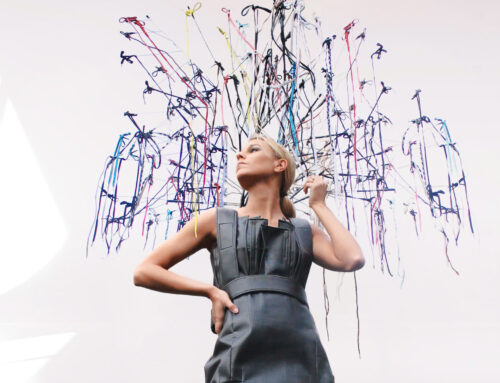How many times have you driven through the neighborhood or walked the dog and gasped at some perfectly acceptable piece of furniture left out by the curb for the trash crew?
But did you pick it up? Heck no, it was daylight.
Or perhaps you have plucked some salvageable-looking piece — say, an ottoman — from curbside on your way to work, only to emerge at the end of the day to a car that smelled like … well, a toilet. So what did you do? You chucked it out to your own large-trash pickup pile, of course.
Well, if you’re aghast by other people’s disposable natures but simply too embarrassed or too pristine to rifle through their trash, rest easy. Because all around you are a host of people who not only aren’t afraid to scour their neighbor’s trash heaps, they’re not even ashamed. In fact, we daresay they’re proud.
***
The mother-daughter team of Kim Aman and Judy Whalen call themselves the “Jogging Junkers.” That’s because about 15 years ago, when they both lived near the M Streets, the two often found treasures in the trash while on their regular morning runs.
Their story, however, goes back even further than that. They are second and third generation junkers, they’ll proudly tell you. As a child, Whalen remembers visiting the dump with her father, who grew up during the Depression. Though they ostensibly went there to drop off trash, Whalen will tell you they often came home with a project for her father. She even does a mean impression of him poking his shoe into piles of rubbish.
“My dad liked to breathe new life into things,” Whalen says proudly, “and he was like that with people, too. He always looked for the treasure in people.”
It’s obvious that mother and daughter have done some serious bonding through the years while they jogged and junked.
One of their favorite stories tells of finding a large shutter while they were out running. Knowing another junker would most likely pick it up before they could bring a car back to claim it, they each grabbed an end and ran down the middle of the street with it.
“We looked like the beginning of a parade,” Whalen says with a grin.
Though Whalen now lives in
“Sometimes we just laugh at ourselves, because our arms will be aching, and we can hardly take another step,” Aman says of their excursions. “But it’s our gain. We’re the lucky ducks, the ones that reap the benefits. People will say things like, ‘Whoa, you’ve spent a lot of money on this!’ And I think, if they only knew …”
Asked to pick her favorite rescued item, Judy sums her attitude toward salvaged rubbish up nicely: “I think it’s all a treasure. There are memories in the trash.”
***
Like many curbside cruisers, Toni Stroud refurbishes her trash. She paints it, decoupages it, glues things on to it. For this mother of three youngsters, it’s something of an escape.
“If you stay home like I do,” says Stroud, who has been doing so for nine years, “you need these outlets.”
She doesn’t have as many pieces as some junkers do, but that’s because she puts a lot of time into each one. She has customized a bench in the bathroom with a water scene and her children’s names. A coffee table and chair in her living room have both gotten special treatment with a few shades of paint. She recently cut the legs down on a newly acquired table to suit her height requirements and, you guessed it, she’s going to paint it.
“It’s giving something a new life,” she says.
Unlike some junkers, however, Stroud doesn’t roll her eyes at what people will throw away.
“A lot of people set things out on their curb prominently, because they’re hoping people will pick it up. They feel guilty, but I understand people don’t have a lot of time,” she says. “I think they do it in hopes somebody will come and rescue it.”
With three children, she also likes the economical and practical points of decorating with other people’s throwaways.
“If you get a piece out of the trash, what are you going to be out? A little time, a little paint, but if it doesn’t work out, you can always put it right back out in the trash. And you don’t have to worry about the kids messing things up.”
Stroud says though her husband has been pretty understanding of her creative outlet (“I’ll show up at the back door with something, and his first reaction is, ‘What is this going to involve from me?’”), she gets mixed reactions from others.
“You don’t know whether to be proud or embarrassed,” she says with a laugh. “You tell one person, and they’re horrified, and the next person is impressed.”
***
Livi Trull most definitely isn’t embarrassed by her trash-cruising ways. That’s probably because, under her care, most rubbish turns into a thing of beauty.
Trull, who worked in the hotel business for years before starting a personal organization business, will paint, tile and reupholster like a madwoman before she’ll let something go to waste.
“I don’t like to see good things thrown away,” she says simply. She has even taken scraps of about 10 different hotel carpets and turned them into one big, colorful area rug. Alone they’d look hideous; sewn together, they look funky and attractive.
“I’ll pick up scraps of material, broken dishes, anything that’s pretty,” Trull says. “You can salvage it, you can put something into it. There are endless possibilities of what it can be.”
Helping her figure out those possibilities are her husband, Michael, and her younger sister Casey, who has an interior design degree.
“For as long as I can remember, my family has always loved this kind of stuff. My sister and I have junked together for four years.”
Trull has also found an economical end to her junking ways. Low on money for Christmas presents, she and her husband found an arts and crafts style coat rack, stripped it down, re-stained it and shipped it off to a family member’s farmhouse in the Northeast. With their treatment, it looks like something out of a Pottery Barn catalog.
And Trull, who spends an estimated 20-30 hours per week junking — she has memorized the large-trash pickup schedule — and refurbishing items, is unabashedly up front about her hobby.
“I’m not afraid to look through it,” she says. “Some people think, ‘Oh, it doesn’t look good’ or, “It’s daylight’ or, ‘That person is in their yard.’ But I just don’t care.
***
In a world filled with female junkers, Steven Thiele is something of an anomaly. A contractor and gardener by trade, he is a serious junker on the side.
“It started when I was just a kid,” he says. “But especially when I was in college [at the
And unlike a lot of female junkers, Thiele is as likely to pick up two-by-fours or Sheetrock as he is to pick up discarded coffee tables or chairs. He has found tiles used in his kitchen backsplash, appliqués used on wall tiles in his bathroom and a ladder he crafted into a pot rack.
“I’ll pick things up without any idea as to what they’ll become, but I just wait around,” he says. “Something eventually will dawn on me about what to do with it.”
He’s also something of a master with salvaged wood, crafting tables that make for good conversation pieces. And he collects old clocks and candlesticks, many of which he found in the trash.
In Thiele’s home, this all translates into a very minimalist décor, but one with more style than many bachelor pads.
And while others have tricks of the trade — favoring certain areas over others, recognizing that elderly people have the best trash, or knowing when to watch out for choice items (for example, after garage sales) — Thiele says he mostly just goes with his gut.
“I look for it wherever I am. I go on instinct. I feel it. I can go to the grocery store and see trash out on some street, and I just know,” he says.
Like many other junkers, though he’s certainly proud of his finds, he’s often astonished at what people will toss out the door.
“It’s amazing,” he says. “We don’t need to be throwing away as much stuff as we do.”






